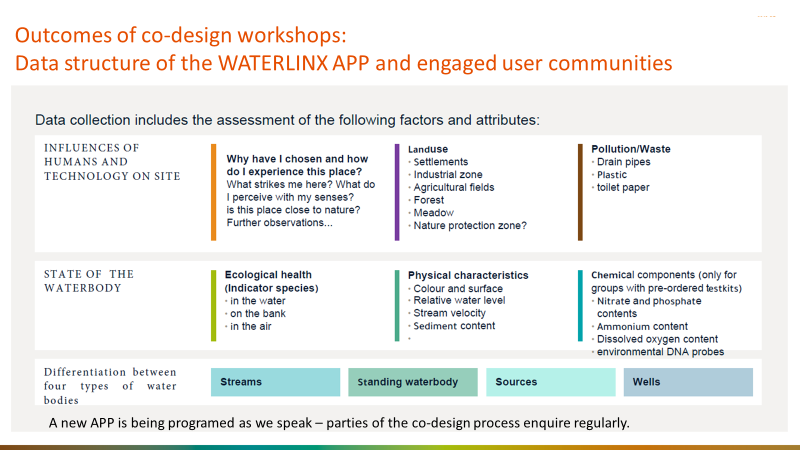Data Structure
The project served to co-design a citizen science approach with tools including a detection kit, sets of indicators for different types of water bodies, a prototype mobile application with decision trees to determine data input possibilities (e.g., sets of site-specific or behavioural data including photos and other observations), which respond to quality criteria from diverse stakeholders and citizen volunteers for the co-creation of actionable knowledge. The co-design process engaged stakeholders from relevant administrations, municipalities, a nature parc and environmental NGOs in four workshops; engaged organisations are interested in continuing collaboration to deploy the tool once it is launched. The process helped to better understand and compare quality and design criteria for tools, processes, and spaces (virtual, institutional, social) for citizen science by diverse stakeholders including experts and lay persons, in diverse settings. The programming of the corresponding API and data base is expected to be completed by July 2022. Figure 2 depicts the data structure of the resulting citizen science tool kit.
These activities helped establish a network of engaged organisations for further work on citizen science and the decentralization of environmental governance. Working with these experts in turn also helps to legitimate to our findings and methods, and to increase chances that they gain traction in practice. Last but not least, partnerships with public bodies and active involvement in advisory committees, and our interactive research style aiming at dialogic learning by all engaged in interviews and workshops, contribute to capacity building relating to citizen science for decentralized or ‘polycentric’ water governance in practice with professionals.

The co-design process resulted in unique sets of indicators that are deemed appropriate for citizen science for adaptive governance in Luxembourg (see e.g. the WATGOV Working Paper 1 by Pickar & König, 2020). From this co-design process we learnt that our initial focus on indicators such as nutrient levels was of interest (nitrate and phosphate content, high levels of which cause eutrophication, a process that undermines species diversity in aquatic habitats). The collaboration with Prof. Jo Hansen at the FSTC allowed to refine some of the indicators on physico-chemical properties (e.g., dissolved oxygen and ammonia levels in surface water) that are suitable for use in citizen science. However, in response to suggestions at the workshops, the original plan to develop a test kit for pathogenic bacteria was replaced with the development of a set of indicator species for the state of health of diverse types of aquatic ecosystems. This part of the project involved close collaboration with Luxemburg’s experts on aquatic ecosystems in different types for water bodies from the water management administration (AGE), the nature and forest administration (ANF) and the NGO Natur & Emwelt, this work was mainly carried out by Lena Hirschler, a Master Student in Biology at the University of Trier (WATGOV Working Paper 2). The engagement of leading experts and practitioners working on water quality in Luxembourg in a research-based co-design process allowed to better understand needs and possible ways in which citizen science can contribute to water governance in Luxembourg from diverse points of view.
The project is scientifically original in the way it conceptualised water quality as an emergent phenomenon in complex social-ecological, technological systems (König et al., 2021; Pickar, 2022), this is apparent both in the citizen science tool set’s design and in the social processes for its design and use. New knowledge produced from semi-structured qualitative interviews, three workshops, and documentary review, includes a detailed and critical understanding of the implementation of laws and regulations relating to water quality, and the data landscape that supports regulatory action (König et al., 2021; Pickar 2022). Prevailing practices are discussed in relation to key criteria for adaptive governance in the literature. The doctoral researcher, then, examined different approaches to environmental citizen science in view of their potential to contribute to more adaptive surface water governance.
Furthermore, an innovative set of indicators on human-environment interactions to invite data collectors to reflect on their sense of place and how it may relate to their well-being emerged from the process (Pickar, Ph.D. Dissertation, WATGOV Working Paper 3 König et al., 2022). After exploration of diverse options to developing citizen science tool kits, including with colleagues at UCL, we concluded that the most resource efficient solution is to outsource it to an enterprise offering the programming and management of citizen science APIs and databases as a service. The enterprise Spotteron is at present programming the citizen science tool (they already host a related project with some relevant functions). The API is expected to be completed and ready for use by July 2022.
This website uses no external trackers, no analytics, just session cookies and values your online privacy.
